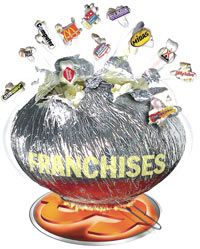


| Hotline: +84 (0) 937 099 599 |
|

Franchising is a relatively new business concept in Viet Nam. Although existing here since the early 1990s, it has been slow to develop and has yet to enjoy the level of popularity it has in more developed countries.
With Viet Nam's accession to the WTO, however, franchising is expected to flourish, especially when the retail distributin sector is opened up to foreign compettion in early 2009.
Before the Commercial Law was enacted, a franchise was regarded as a type of technology transfer or licensing agreement and was governed by Decree No 45/CP/1998. The decree tended to have a freezing effect on the establishment of franchises, imposing a maximum royalty of 5 per cent of net sales such that parties to franchise agreements were not free to agree a higher rate of return.
Lack of confidence in IP rights protection in Viet Nam also contributed to the concerns of foreign franchisors.
With the Commercial Law and its implementing documents, Decree No 35/2006/ND-CP and Circular No 09/2006/TT-BTM, as well as changes to the Law on Intellectual Property, the nation developed a legal foundation for all aspects of franchising.
A franchise is a business arrangement in which a franchisee pays for a franchisor's know-how, reputation, technical information and expertise, obtains a licence to use the franchisor's trademarks, proprietary processes and the like, and carries on the franchised business subject to strict controls agreed upon with the franchisor. The franchisee, in turn, benefits from the established customer base and built-in marketing for the franchised product or service. Unlike ordinary business models in which, subject to the relevant laws, a business owner is free to set up and run the business as he pleases, a franchised business is regulated by the body of franchising and licence agreements executed between the franchisor and the business operator, the franchisee.
Vietnamese law defines the relationship in slightly different terms. Under the Commercial Law, a franchise is a commercial activity pursuant to which franchisors require franchisees to purchase and/or sell goods, or provide services, in accordance with business methods prescribed by the franchisor. In doing so, the franchisee will make use of the franchisors' trademarks, trade names and trade dress, business know-how, slogans, logos and advertisements.
The franchisor is entitled to supervise and assist franchisees in conducting their business activities (Article 284). The law requires that the business system being franchised must have been in operation for at least a year prior to being franchised and the franchisor must have registered its franchise with authorised agencies. Meanwhile, the prospective franchisee must be licensed to engage in the relevant business sector. These requirements together are designed to ensure that the business system being franchised has the necessary reputation and expertise and that the franchisee will maintain that reputation and expertise.
Information disclosure is mandatory in establishing the franchise relationship. The law provides that the franchisor must provide the prospective franchisee with a copy of the franchise agreement and franchise introduction statement for consideration at least 15 days before the franchise agreement is signed. The franchise introduction statement must contain certain information, in accordance with the standard form provided in Circular No 09, and be filed with the relevant authorities.
The law otherwise gives franchisors and franchisees the freedom to draft contracts as they please. The parties are free to draft and enforce terms related to royalties, fees and termination clauses. Where the franchise involves foreign elements, parties are free to choose the governing law for the agreement.
The law provides for unilateral termination of the franchise agreement in certain situations but isn't entirely clear as to these situations. Decree No 35 provides that the franchisee will be entitled to terminate the franchise agreement unilaterally if the franchisor breaches obligations specified in Article 287 of the Commercial Law, e.g., the obligation to provide training materials, initial training or technical support. The decree does not make it clear, however, whether a breach of any one of these obligations will be sufficient to entitle the franchisee to terminate the agreement unilaterally, or whether it will be necessary to show that there has been a breach of all obligations.
Intellectual property is an essential part of any franchise relationship as the franchisee will be making use of the franchisor's intellectual property. Decree No 35 affirms that the licensing of intellectual property is governed by the Law on Intellectual Property. In the context of a franchise, the licensing of intellectual property can be dealt with within the franchise agreement or it can be the subject of a separate agreement. Most lawyers choose to deal with it in a separate licensing agreement to facilitate enforcement.
All intellectual property to be used in the franchise, trademarks, patents, designs, processes, etc., should be clearly specified and dealt with in the agreements. Some intellectual property, e.g., trademarks, patents, and utility solutions must be registered before they can be licensed. The intellectual property licensing agreement should be well drafted to ensure compliance with Vietnamese law and to protect the interests of both parties. Although it is not necessary to register the licensing agreement, it cannot be relied upon in enforcement proceedings against third parties unless it is registered. The franchisor is obliged to inform the franchising registration authorities, within 30 days, of any change in the status of intellectual property licensed in connection with a franchise agreement.
Confidentiality and the maintenance of trade secrets is another importance element of the franchise agreement. Trade secrets might, for example, exist in formulae or recipes, business plans or pricing strategies that make a particular franchised system unique. The Law on Intellectual Property defines a trade secret as technical and business information that is unknown to the public and capable of bringing economic benefit to the owner and can be lawfully protected for as long as it remains secret.
Source: vietnamnews 8 biggest real estate M&A deals in 2013
8 biggest real estate M&A deals in 2013
 What businesses can and can't do when cutting jobs
What businesses can and can't do when cutting jobs
 Japanese pharma invests nearly $100 million in Vietnamese medicine maker
Japanese pharma invests nearly $100 million in Vietnamese medicine maker
 New regulations for labour subleasing
New regulations for labour subleasing
 Ten Tips for Making Solid Business Agreements and Contracts
Ten Tips for Making Solid Business Agreements and Contracts